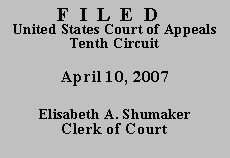

| UNITED STATES OF AMERICA,
Plaintiff-Appellee,
v.
DAVID G. PFLUM Defendant-Appellant. |
No. 06-3301
(D.C. Nos. 06-CV-3111-SAC &
04-CR-40008-SAC (Kansas) |
Mr. Pflum was convicted by a jury on eight counts of failure to pay quarterly employment taxes, in violation of 26 U.S.C. § 7202, and three counts of failure to file a federal income tax return, in violation of 26 U.S.C. § 7203. He was sentenced to 30 months imprisonment.(2) He appealed his conviction, claiming the district court erred in refusing to give the jury his proposed instruction on "willfulness," and in denying a motion to strike the testimony of two IRS agents regarding the amount of taxes Mr. Pflum allegedly owed the government. We affirmed. United States v. Pflum, 150 Fed. Appx. 840 (10th Cir. 2005). Regarding his second claim, we held that because Mr. Pflum's objection to the IRS agents' testimony was untimely, he could not assert a claim on appeal that the testimony was admitted in error.
Mr. Pflum filed the present § 2255 action asserting his counsel was ineffective for failing to object in a timely fashion to the agents' testimony and to the accompanying exhibits. In a thoroughly reasoned opinion, the district court denied Mr. Pflum's motion, concluding he had failed to show that his counsel's untimely objections prejudiced his defense at trial or resulted in an illegal sentence. Rec., vol. I, doc. 121. The court also denied Mr. Pflum's application for a certificate of appealability (COA). Id. doc. 127.
Issuance of a COA is jurisdictional. Miller-El v. Cockrell, 537 U.S. 322, 335-36 (2003). A COA can issue only "if the applicant has made a substantial showing of the denial of a constitutional right." 28 U.S.C. § 2253(c)(2). "A petitioner satisfies this standard by demonstrating that jurists of reason could disagree with the district court's resolution of his constitutional claims or that jurists could conclude the issues presented are adequate to deserve encouragement to proceed further." Miller-El, 537 U.S. at 327.
In order to establish a successful claim for ineffective assistance of counsel, Mr. Pflum must show that counsel's performance was deficient and that this deficient performance prejudiced his defense, depriving him of a fair trial with a reliable result. Strickland v. Washington, 466 U.S. 668, 687 (1984). In determining Mr. Pflum failed to show that his counsel's performance prejudiced his defense, the district court found that the testimony and exhibits Mr. Pflum claims his counsel was deficient in failing to challenge pertained to the amount of taxes Mr. Pflum owed the government. After reviewing the trial record, the court concluded the amount of taxes owed was never a defense Mr. Pflum asserted at trial, and therefore his counsel's failure to object to the manner in which the amount was calculated did not interfere with Mr. Pflum's chosen "good faith" defense. Moreover, the court noted Mr. Pflum's concession on appeal "that the challenged testimony of [the agents] 'affected only his sentence,' not his convictions." Rec., vol. I, doc. 121 at 10.
Mr. Pflum contends on appeal that he was prejudiced by counsel's failure to object because "his entire sentence was based on inadmissible evidence of the 28% of the wages that he did not deduct from his employees' wages." Aplt. Br. at 4. The district court concluded Mr. Pflum failed to show that, but for his counsel's allegedly deficient performance, the result at sentencing would likely have been different. The court pointed out that the amount of taxes Mr. Pflum owed could have been constitutionally determined by the court instead of the jury at a sentencing hearing post-Booker. Id. at 11.
After reviewing the record, we conclude Mr. Pflum has not demonstrated that jurists of reason could debate the district court's resolution of his ineffective assistance of counsel claim. Mr. Pflum's assertion that he would have been given a lesser sentence if his counsel had objected to the IRS agents' testimony and the government's exhibits is speculative at best and fails to meet the requirements of the second Strickland prong for a showing of prejudice.
Accordingly, for substantially the same reasons given by the district court, we DENY Mr. Pflum's application for a COA and DISMISS his appeal.
ENTERED FOR THE COURT,
Stephanie K. Seymour
Circuit Judge
*.This order is not binding precedent, except under the doctrines of law of the case, res judicata, and collateral estoppel.
1. We liberally construe Mr. Pflum's pro se application. See Hall v. Scott, 292 F.3d 1264, 1266 (10th Cir. 2002).
2. Mr. Pflum's trial took place between the two Supreme Court opinions in Blakely v. Washington, 542 U.S. 296 (2004), and United States v. Booker, 543 U.S. 220 (2005). The trial court, in an abundance of caution, submitted to the jury all applicable sentencing factors, including the amount in taxes owed by Mr. Pflum. Accordingly, the sentencing range faced by Mr. Pflum was calculated using facts found by a jury under the reasonable doubt standard. See United States v. Pflum, 150 Fed. Appx. 840, 841 (10th Cir. 2005).